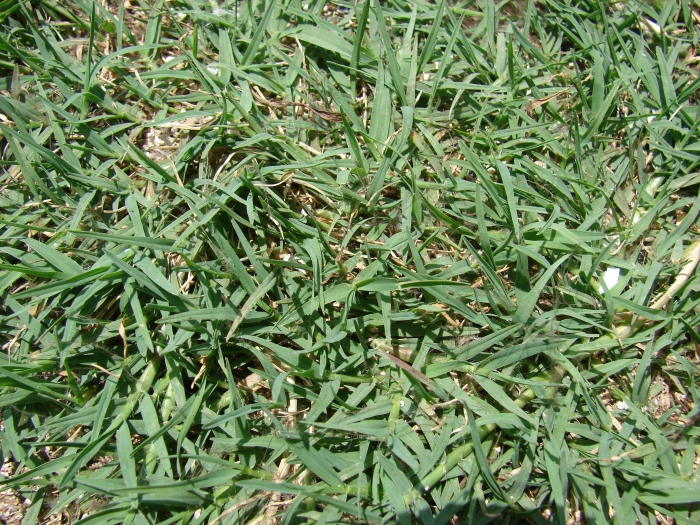Bermuda Grass
(Cynodon dactylon)
Bermuda Grass (Cynodon dactylon)
/
/

Forest & Kim Starr
CC BY 3.0
Image By:
Forest & Kim Starr
Recorded By:
Copyright:
CC BY 3.0
Copyright Notice:
Photo by: Forest & Kim Starr | License Type: CC BY 3.0 | License URL: https://creativecommons.org/licenses/by/3.0 | Uploader: BotMultichillT | Publisher: Wikimedia Commons | Title: Starr_080531-4786_Cynodon_dactylon.jpg | Notes: User created page with UploadWizard |









































































Estimated Native Range
Summary
Cynodon dactylon, commonly known as Bermuda grass, is a perennial grass native to arid and semi-arid regions of Africa, Asia, Australia, and Southern Europe. It has adapted to a wide range of ecological conditions, including open grasslands and savannas, where it thrives in warm temperatures. Bermuda grass typically has grey-green blades that are short, with stems that are slightly flattened and often tinged purple. It is known for its deep root system, which can extend over 2 meters (6.6 ft) deep in drought situations with penetrable soil, although most of the root mass is usually found within the top 60 centimeters (24 in) of the soil. This grass spreads via stolons, rooting at the nodes to form a dense mat, which contributes to its resilience and fast recovery from damage.
Bermuda grass is valued for its durability and rapid growth, making it an excellent choice for sports fields, lawns, and golf courses, especially in the southern and southeastern U.S. where its heat and drought tolerance are advantageous. Its ability to quickly recover from wear and tear is particularly beneficial for high-traffic areas. Bermuda grass requires full sun and can tolerate low to medium water conditions, preferring soils with medium drainage. It has a relatively coarse texture with many cultivars developed for specific turf needs. Gardeners should be aware that Bermuda grass can be invasive outside its native range and may require management to prevent it from overtaking other plantings.CC BY-SA 4.0
Bermuda grass is valued for its durability and rapid growth, making it an excellent choice for sports fields, lawns, and golf courses, especially in the southern and southeastern U.S. where its heat and drought tolerance are advantageous. Its ability to quickly recover from wear and tear is particularly beneficial for high-traffic areas. Bermuda grass requires full sun and can tolerate low to medium water conditions, preferring soils with medium drainage. It has a relatively coarse texture with many cultivars developed for specific turf needs. Gardeners should be aware that Bermuda grass can be invasive outside its native range and may require management to prevent it from overtaking other plantings.CC BY-SA 4.0
Plant Description
- Plant Type: Grass
- Height: 0.3-0.5 feet
- Width: 0.3-0.5 feet
- Growth Rate: Moderate
- Flower Color: N/A
- Flowering Season: Summer
- Leaf Retention: Evergreen
Growth Requirements
- Sun: Full Sun
- Water: Low, Medium
- Drainage: Medium
Common Uses
Drought Tolerant, Erosion Control, Fire Resistant, Groundcover, Low Maintenance, Salt Tolerant
Natural Habitat
Native to arid and semi-arid regions of Africa, Asia, Australia, and Southern Europe
Other Names
Common Names: Green Couch, Plain Couch, Common Couch, Indian Couch, Common Bermuda Grass, Gewonekweek, Theel, Najeel, Hundszahngras, Gewöhnliches Hundszahngras
Scientific Names: , Cynodon dactylon, Capriola dactylon, Cynodon dactylon var. pulchellus, Cynodon maritimus, Cynodon affinis, Cynodon maritimus var. grandispiculus, Cynodon dactylon var. affinis, Cynodon dactylon var. longiglumis, Cynodon hirsutissimus
GBIF Accepted Name: Cynodon dactylon (L.) Pers.